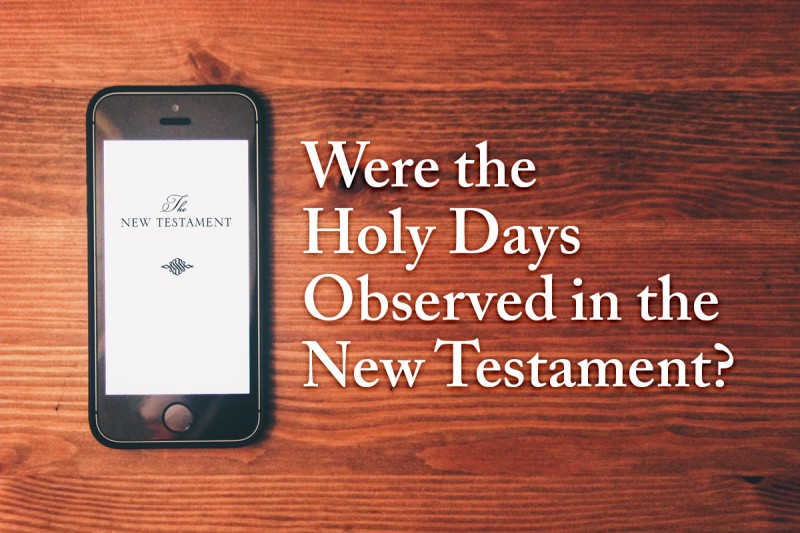Were the Holy Days Observed in the New Testament?
by Andrew Travers - June 15, 2023
A recent conversation with a coworker led me to study why we believe in observing the holy days. Does the New Testament support our beliefs?

I recently had a conversation with a coworker who is a professing Christian. Being aware that I am a Christian, he asked me about the holy days. He asked whether Christ or any of the apostles told us in the New Testament to observe the holy days described in Leviticus 23.
This led me to do some personal study on the holy days in the New Testament.
One example was easy to find. Paul encouraged the brethren in Corinth to observe the Days of Unleavened Bread in the proper spirit and mindset. He wrote, “Therefore let us keep the feast, not with old leaven, nor with the leaven of malice and wickedness, but with the unleavened bread of sincerity and truth” (1 Corinthians 5:8).
This was a good start, but it’s just one festival out of seven listed in Leviticus 23.
Does that mean this is the only one we should keep? Or do we still need to observe all of them?
Did Christ observe the holy days?
Let’s start with Jesus Christ, the Son of God, who set the perfect example for us to follow. What was His example in observing the festivals?
We find mention of His parents bringing Him to Jerusalem to observe the spring festivals (Luke 2:41-42). Keeping the Passover was His custom, which He did right up to the end of His physical life on earth (Matthew 26; Mark 14; Luke 22; John 2:23; John 4:45; John 13).
There are records of Jesus Christ also observing other holy days. In John 7, we find a reference to Jesus observing the Feast of Tabernacles. In John 5:1, we find a reference to Jesus observing “a feast of the Jews” in Jerusalem. This could refer to the Feast of Unleavened Bread or the Feast of Tabernacles.
So, there is evidence that Jesus, our role model, kept the holy days outlined in the Old Testament.
Did the apostles observe the holy days?
What about the apostles? Did they follow the example of Jesus and observe the holy days?
In Acts 2:1, which took place after Jesus’ death, we read that the disciples were together on the Day of Pentecost.
Years after that momentous occasion, members of the New Testament Church still kept Pentecost. In Acts 20:16, we read of Paul wanting to be in Jerusalem for the Day of Pentecost.
We should also note Paul’s reference to keeping the holy days in his letter to Corinth. He wrote to the brethren, “I will tarry in Ephesus until Pentecost” (1 Corinthians 16:8). Corinth was a primarily gentile congregation. In referring to the holy days, Paul shows that they were being taught to the brethren years after Christ’s death and resurrection.
Holy day observance was not confined to the city of Jerusalem. The knowledge of the holy days was being taught to congregations in other cities, even to members who were gentiles.
Another reference to the keeping of the holy days is found earlier in Acts 20. Luke wrote that Paul left Philippi “after the Days of Unleavened Bread” (verse 6).
Was this just Luke trying to mark the time of year when this occurred? Another verse supplies the answer. In Acts 18, Paul told the Jews in Ephesus, “I must by all means keep this coming feast in Jerusalem” (verse 21). This tells us again that Paul was committed to observing God’s festivals.
The holy days weren’t done away with. There is no record of the apostles teaching that observance of these days was unnecessary.
What does this mean for us?
Many members of the first-century Church were Jews, people who knew all about the Scriptures and the seriousness of observing them. They would have kept the festivals since childhood.
As the Church grew and expanded, the apostles made sure that even the gentile brethren knew the importance of the holy days. The brethren didn’t always observe them properly, but they understood the significance of these days and had instructions on how to observe them (1 Corinthians 11:20-34).
The Bible also tells us that the Feast of Tabernacles will be observed in the future, during Christ’s 1,000-year reign on earth. In Zechariah 14:16, we are told, “Everyone who is left of all the nations which came against Jerusalem shall go up from year to year to worship the King, the LORD of hosts, and to keep the Feast of Tabernacles.”
If a nation decides not to observe this sacred festival, “they shall have no rain; they shall receive the plague with which the LORD strikes the nations who do not come up to keep the Feast of Tabernacles” (verse 18). The implication of this passage is that all the holy days will be kept in the world to come.
As we have seen, Christ and the early Church observed the holy days. Prophecies in the Old Testament indicate that these days will also be observed by every nation in the Millennium.
We can look behind us and see how the holy days were kept by the early Church. We can look forward and see that they will be kept in the future. With these facts in mind, we can be confident that we are correct in observing them today.
To learn more, download our booklet From Holidays to Holy Days: God’s Plan for You or study Lessons 8 and 9 of our Bible Study Course.
Continue Reading

How Should You Deal With Bullies?
by Bellinda Simanjuntak - May 30, 2023

Favor and Blessings Come From God
by Rebekah Leyden - March 10, 2023
